#józef poniatowski's descendants
Text
Józef Poniatowski’s children and descendants
Because a couple of months ago there’s been a discussion about Napoleon marshal’s children I decided I out to share with you the info about Józef Poniatowski’s issues and descendance.

Though never married, prince Józef nevertheless had two illegitimate sons.
The oldest one was Józef Szczęsny Mauricy Chmielnicki, born on the 17th of September, 1791.
The mother of the boy was most probably Poniatowski’s mistress of that time, the actress named Małgorzata Magdalena Wiktoria “Zelia” Sitańska (though there are as well versions it might have been another woman, for example, Zelia’s step-mother, also an actress - more on the topic I wrote here)
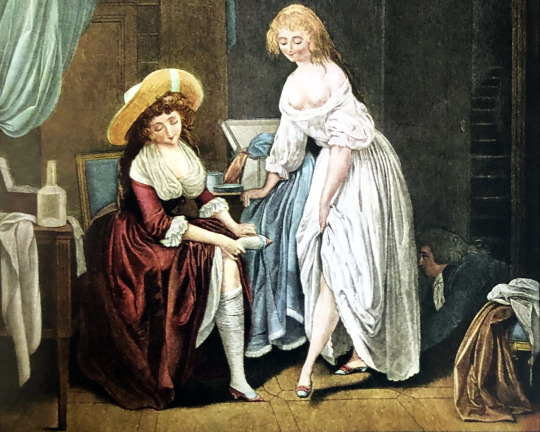
Zelia and here step-mother, a colored engraving
As for the fate of the boy - in his youth (before 1807) he started a military career in the Army of... Austria. Most probably it was prince Józef himself who arranged it, because his career started in the Austrian army too. (Another question is why Poniatowski didn’t “transfer” his son into the Army of the Duchy of Warsaw after the latter had been created, but, I’m afraid, we’ll never know the answer.)
And when in 1809 Austria attacked the freshly created Duchy, Józef Chmielnicki took part in the war... on the side of the Austrians. (And his father kinda accepted this, because in his will written 3 years later, in 1812, Poniatowski mentioned not only his firstborn but as well the fact that the latter was an officer in the Austrian Army.)
Chmielnicki fought as well in the next coalition wars, in 1812-1815 (against Napoleon as well), in 1831 he fought in defense of the Roman ecclesiastical state against local insurgents; for this he received the papal Order of St. Gregory. He also had the Austrian Military Cross. In 1856 he retired with the rank of colonel. He died unmarried in Vienna in 1860.
Unfortunately, I wasn’t able to find any image of Józef Chmielnicki, but in his military service records there is a little bit on his appearance:
Tall, of good health, very lively temperament and honest and reliable character. Polite and tidy; sometimes a bit violent and not always consistent. Zealous and active, with a special penchant for service in rifle units. He was wounded twice. He is fluent in German and Polish in speech and writing, speaks French and a little Italian. A very good staff officer, suitable for a regiment commander.
More do we know about Prince’s Józef’s other son, who was born on the 18th of December, 1809 in Warsaw and was then was given the name Józef Karol Ponitycki.
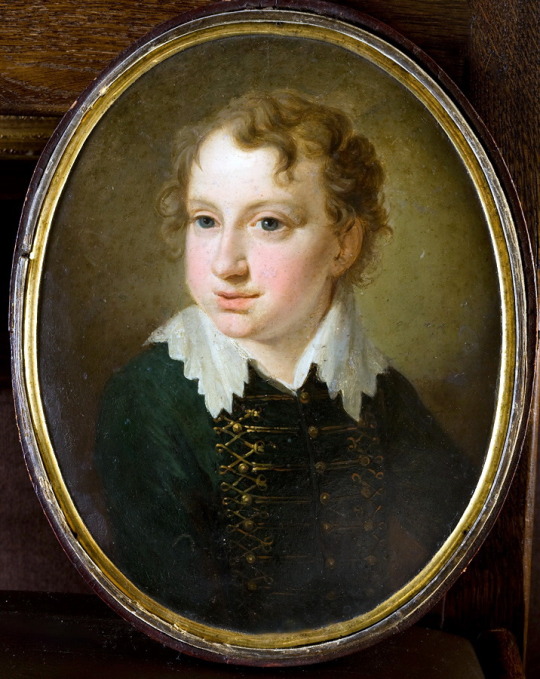
Józef Peszka, Portrait of Józef Ponitycki, 1815
As for Józef the second mother - there are no doubts in it, it was prince Poniatowski’s another mistress, Zofia Czosnowska née Potocka (more about her - here).
Though Czosnowska was married, prince Józef acknowledged her child and mentioned him in his will.
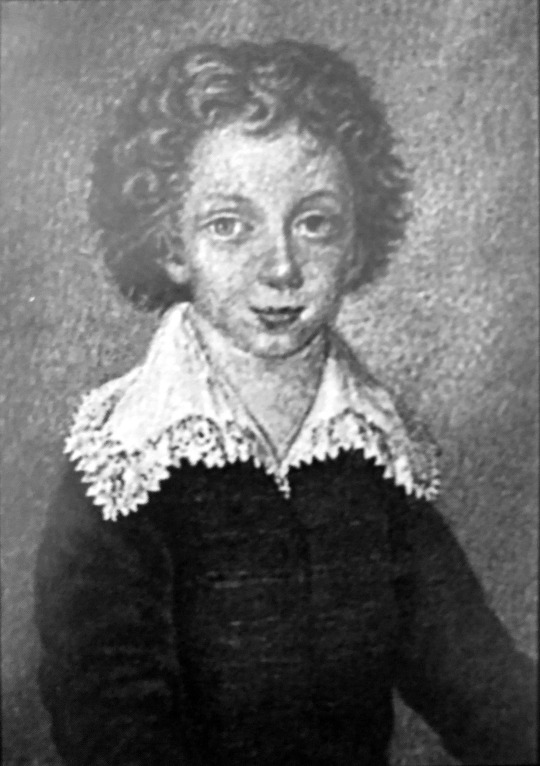
A miniature showing Ponitycki at the age of ten
The boy’s mother, however, didn’t care for her child much. Having divorced her official husband she married again in 1815, then placed her son in the custody of his aunt, prince’s Józef sister countess Maria Teresa Tyszkiewicz.
In the 1821 countess Teresa became the boy's legal guardian (Czosnowska officially gave him up) and in 1828 adopted him, changing his surname from Ponitycki to Poniatowski and adding Maurycy (Maurice) as his third name, thus making the boy the namesake of her long-term love Charles Maurice de Talleyrand.
And a little bit before, in 1826, Józef the younger gained French citizenship, and at the age of 18 (1827) he volunteered to join the French army.
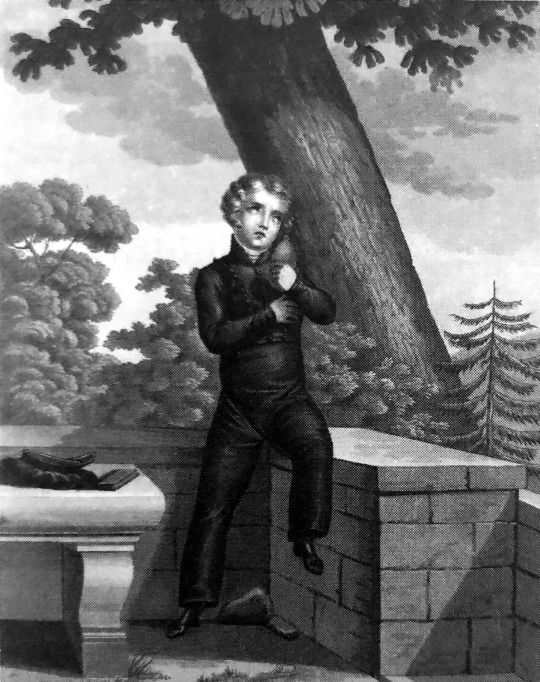
An anonymous painter, Prince Józef's son grieving after his father, 1820
The enlistment papers say that he was a healthy, blue-eyed, tall (1.79 m) blond, oval face, strong chin and aquiline nose. After graduating from school, he took part (as chasseur sergeant) in the Greek campaign in the Peloponnese (1829), later he was transferred to Algiers (1830), but he quickly returned to France.
During the July Revolution in Paris that year Poniatowski was among those soldiers who were putting it down, but when a year later the November Insurrection broke out in Poland he, together with his friend, Count of Montebello, a son of the Marshal Lannes, went to Poland to join the uprising. After the fall of the uprising, Józef returned through Galicia to France, where joined the rifle regiment as a captain and took part in the war in Algiers with Abd del-Kader in the years 1832-1836.
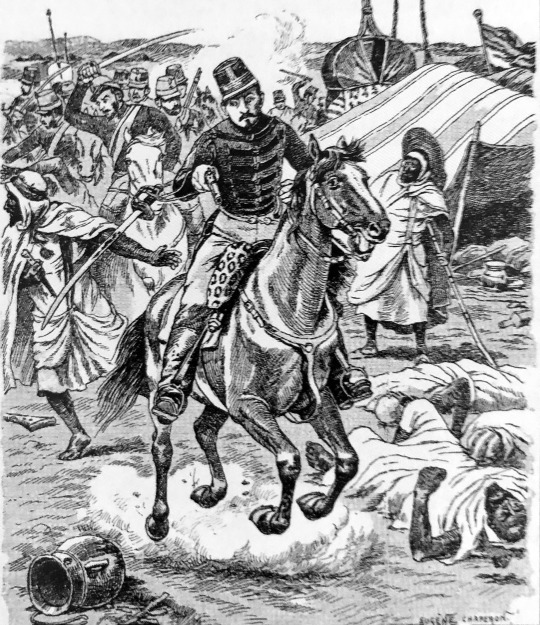
Józef Ponitycki-Poniatowski charges the camp of Emir Adb-el-Kader, a drawing by a French painter Eugène Chaperon
In 1839, driven by longing for his homeland, Poniatowski came to Kraków and made efforts to obtain permission to return to Warsaw. But the Russian Governor Paskevich refused him entrance and even tried (unsuccessfully) to confiscate) properties Józef inherited from his father and aunt.
Not being allowed to return to Poland, Poniatowski returned to France and to his regiment. He died on February 15, 1855 in Tlemcen, Algeria, and was buried there.
As for Józef Karol Poniatowski’s private life - in 1836 he married an Englishwoman, Maria Anna Semple. They have two children - a son, Józef Stanisław, born in 1837, and a daughter, Maria Teresa, a year younger.
Józef Stanisław joined the army at the age of 17 and went on the Crimean campaign. During the siege of Sevastopol, he was appointed lieutenant for his bravery. He then served in the cavalry regiment. He left the service due to ill health. In 1866 he married Léonide Marie Victoria Charner, the daughter of a French admiral, the chief commander of a sea expedition to China.
Six weeks after his marriage with Léonide Charner in 1866 he became mental ill. From 1880 until his death July 20, 1910 in Geel, Belgium, where he resided as a psychiatric patient in the wellknown Geel "Colonie des Aliénés''. (Many thanks to Werner for providing me with this information).
As for Józef Stanisław’s issue - there we have a kind of discrepancy. According the Polish sources like, for example, the Genealogy of the Descendants of the Great Sejm , he died childless but according his profile at geni.com he did have a son, named André whose descendants still live in the US. (The site doesn’t allow to see all the data but it is highly probably that the direct male line continues till our days.)
Maria Teresa, after the death of her father, was taken care of by the Duchess d'Eckmühl, the widow of the Marshal Davout. In 1859, Maria Teresa married Louis de Guirard, Comte de Montarnal, grandson of Marshal Ney. He was an official in the Ministry of Treasury. They had seven children: three sons and four daughters. But neither of those, according both the Genealogy of the Descendants of the Great Sejm and Geni.com had issue.
What’s more, according Geni.com Józef Karol Poniatowski after the death of his first wife married again. That time he took as a wife a woman named Elżbieta Fuchs, and they have a son named Wojciech Józef. That Józef, it looks like, was married, but no information about his issue is provided.
#Poniatowski#józef poniatowski#zelia sitańska#Józef Szczęsny Mauricy Chmielnicki#zofia czosnowska#Józef ponitycki#józef karol maurycy poniatowski#józef poniatowski's children#józef poniatowski's descendants#józef peszka#eugène chaperon
22 notes
·
View notes
Text
Napoleonic era fiction
Having shared with you the history books about the Napoleonic era I've read recently, let me talk a little bit on the topic of historical fiction. (Not that I read this kind of book much, but there are some I'd like to express my opinion of.)
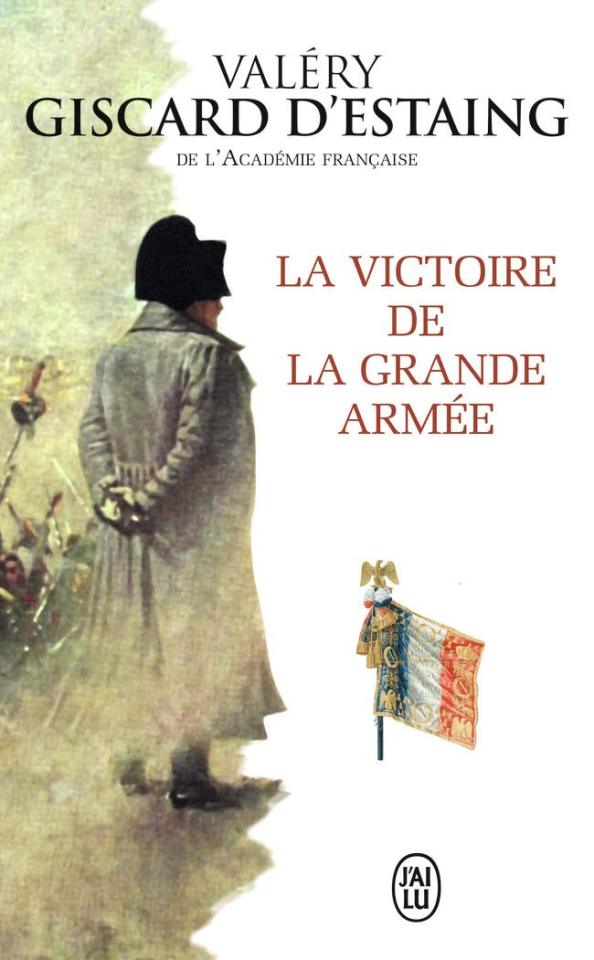
The first one in my list will be La Victoire de la Grande Armée, by the former French President Valéry Giscard d'Estaing. It's an alternative history book, where it is imagined what might have happened if in 1812 the Grand Armée had left Russia just after the battle of Moscow. (A spoiler - as one can guess from the title, everything should have went well for the Napoleonic France).
Alas, there are a lot of discrepancies in the book (like, for example, Poniatowski and Grouchy are marshals already in 1812); in additional, the protagonist (a general named François Beille) seems to be a kind of Marty Stu. Nevertheless, I liked this book, because... in that reality prince Józef didn't die in the battle of Leipzig (because the battle just didn't take place)! On the contrary, he's being made the king of the the restore Poland (though, I must admit, Poniatowski in fact didn't long for a crown - more on the topic here).
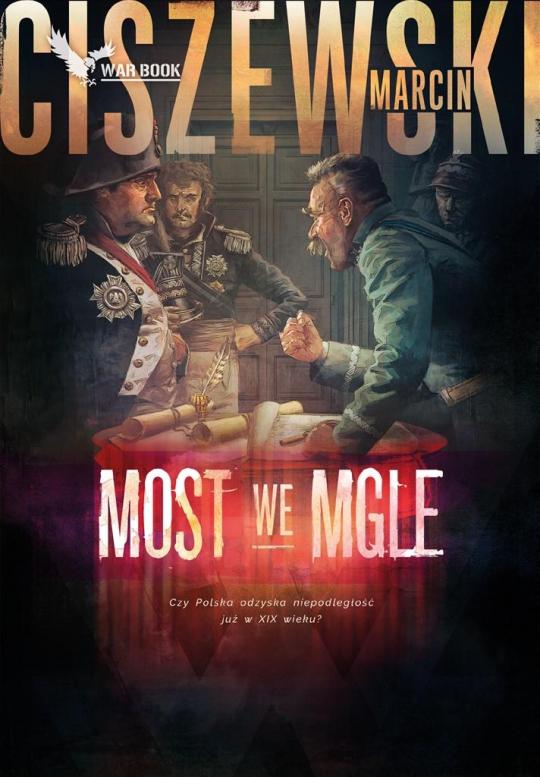
2. Having touched the topic of alternative history I can't help omitting another book (which, unfortunately, hasn't AFAIK been translated to any foreign language that's why I can now recommend it to my Polish speaking friends only). The book's title is Most we mgle (A Bridge In A Fog) and it is written by Marcin Ciszewski.
The plot is that in 1930ies Poland there appeared a time hole leading to 1813, using which a squad of the Polish soldiers was able to go back in time and change the result of the battle of Leipzig. So, in that universe prince Józef didn't die either )) (Though even there he had to become a king ;))
3. From alternative history of Poland let's switch to the real one, and here I have to digress a little to introduce you the next set of book. A friend of mine had once recommended me The Polish trilogy, a series of book by an American writer James Conroyd Martin, mentioning that in one of the books prince Józef's death in the battle of Leipzig is described. (A spoiler - there was such a scene in the second book, but it was not the most detailed description of the event I've stumbled upon, given all the books on the topic I've read, though it may be the only of those written in English.)
Having started to read the first book, I soon discovered that it wasn't an entire fiction, but was based on a real diary of a woman, Anna Maria Berezowska-Stelnicka, who lived in Poland in the end of the XVIIIth century. The diary was inherited by her descendants who live now in the US, and it was also translated to English and published and this is a book I do recommend to read:
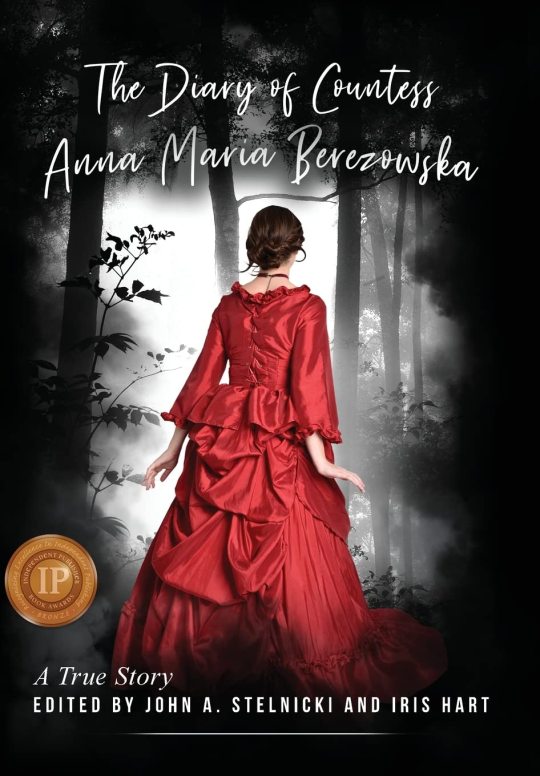
4. And what about the book series? Alas, here I can't be so enthusiastic.
First, it contained a lot of typos (in Polish names etc.; it might have been fixed in the Polish edition, but I was able to find the English one so I read it) and even some historical (for instance, women working as civil-cervants' secretaries of Russian administration in Warsaw in 1830-ies) and geographical discrepancies (for example, according to the author to the East of Warsaw there are stepps which go all the way to Moscow).
In addition, I didn't like how Martin adjusted the real characters from the diary on which he based the first book of his. Also, it surprised me that John Stelnicki, Anna's descendant who is the current owner of her diary, chose a male writer to process the diary into a fiction story (in my opinion, in the book there were scenes where the female protagonist would act illogical and unfeminine and those were the scenes not present in the original diary).

And the second and the third books aren't at all based on the diary events - the action of both diary and the first book, Push not the River, ends in 1794. The second one, Against a Crimson Sky, is set in the span from 1794 to 1814, the last one, The Warsaw Conspiracy, is dedicated the Polish November Uprising which started in 1830 and lasted till October of the next year.
The second book I liked more (and it was there where prince Józef's death was described), but unfortunately, the discrepancies between the characters behavior and how real people of that time did think and act (if to compare with the real diaries and memoires of other real people) only enhanced. (Though it was kind of fun to recognize whose memoires the author was using to describe this or those event).
The last book... well, the November Uprising isn't really my cup of tea, so there were less things there that did catch my eye (but nevertheless, as I've mentioned above, they were). And I was really disappointed that in the epilogue of the book there was nothing about how Anna's family got to America. For because of the Uprising they had to leave Poland everything pointed out that they or there descendants wouldn't have return to the motherland until Poland gained independence in 1918... That's why, taking into account that Anna's descendant who is the owner of her diary does live in the US, it seemed to me it was worth to mention that the family moved to the New World (even if the real chain of events due to which the diary ended in the US couldn't be restored).
5. And the last image is to illustrate more of a question than a recommendation. For the sake of inspiration I decided to look for historical romances where the story is set in Napoleonic France. But, to my great disappointment, it turned out that there are not very much of them. The French Wikipedia in fact mentioned the only one series of books - Juliette Benzoni's Marianne, the set which I read, and even more than once. But those books, in my opinion, though may arouse interest in a person of fourteen, but can't IMHO inspire people in their forties (at least due to the fact that the main love interest of the heroine is a cynical abuser).
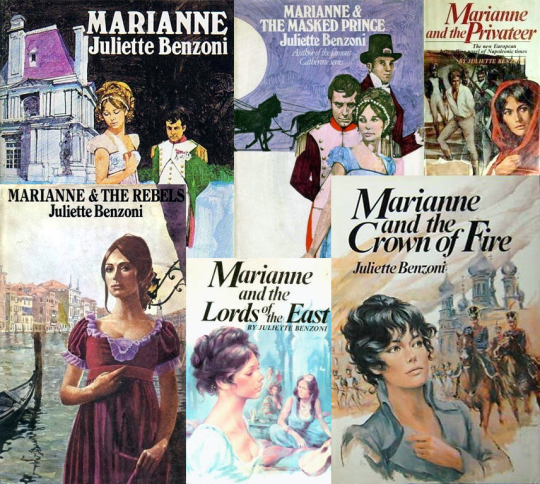
That's why I would like to ask you, my friends, for a recommendation of historical romance with the action set in Napoleonic France or its satellites (and where the protagonists are, of course, on the French side ;))
#Valéry Giscard d'Estaing#1812#napoleon#La Victoire de la Grande Armée#Józef Poniatowski#napoleonic era#napoleonic era fiction#Most we mgle#Marcin Ciszewski#alternative history#Anna Maria Berezowska-Stelnicka#James Conroyd Martin#The Polish trilogy#historical romance
10 notes
·
View notes
Note
Jozef Stanislas Poniatowski (1837-1910) was the son of Charles Maurice Joseph. I read on your site that he died in 1910 in Paris. That's wrong. Six weeks after his marriage with Léonide Charner in 1866 he became mental ill. From 1880 until his death July 20, 1910 in Geel, Belgium, where he resided as a psychiatric patient in the wellknown Geel "Colonie des Aliénés'', where the chief psychiatrist Dr. Edmond Aerts was the grandfather of my grandmother. I found his death act in the Geel official registers where he is named J.S. Prince Poniatowski.
Werner Van den Bergh (Belgium)
Thanks a lot for the information, Werner! I’ve update the post according it.
3 notes
·
View notes
Text
Contents of my blog (mainly devoted to prince Józef Poniatowski)
Some posts are re-blogs of my friends’ ones, for them the authors are given in brackets.

(The images added just to draw attention)
Portraits:
On paintings as a child
Painted during his lifetime
The most known posthumous (and its copies)
Other posthumous portraits
19th century “Photoshops”
Sculptures
Not looking like himself:
Engravings etc
With blue eyes
Family album:
Parents and sister
Grandparents, uncles and cousins
Some maternal relatives
Photoshops:
Napoleonic Christmas
Ofelia (by duc_du_orleans from Insta)
Riding naked on the streets of Warsaw
Women trying to seduce him
Relationships:
With women:
Karolina von Thun, Zelia Sitańska, Henriette de Vauban and Zofia Czosnoswka (first love, two mothers of his two sons and a French mistress older than him)
Julia Potocka, Rozalia Lubomirska, Barbara Kossowska (three ladies who tried to seduce him)
Princess Augusta of Saxony (a would-be bride that didn’t happen)
Pauline Bonaparte, Maria of Württemberg, Zofia Zamoyska (women with whom he might have had a kind of “romance”)
Queen Louise of Prussia, Anetka Potocka and the rest (of the names ever mentioned)
Why Poniatowski never married
Poniatowski’s children and descendants
With men:
Napoleon
Murat
Davout (a post of @histoireettralala)
Ligne, Schwarzenberg, Sanguszko, Linowski, Szumlański, Fiszer, Morand, Bignon (pals and comrades)
The Czartoryski family, Talleyrand
Dąbrowski, Zajączek, Sokolnicki, Jérôme Bonaparte (“frenemies”)
Prince Józef’s strong and weak points, quotes etc (a little bit about his personality)
His attitude towards becoming a king
A little bit on the topic of prince Józef’s height
Poniatowski’s favorite horse
Life events:
Place of birth, Vienna
Šabac, 1788
Zieleńce, 1792
Raszyn, 1809
Galician campaign, 1809
Narrow escape from the British Navy when visiting Gdańsk, 1810
Smolensk, 1812
———
Prince Józef’s last year:
Crossing the Berezina river, November 1812
Soldiers’ visit to the Copper-roofed palace, December 1812
Leaving Warsaw for good, February 1813
In Kraków, March-April-beginning of May 1813
Last evening in Kraków, May 1813
Entering Saxony, June 1813
Last summer and September, 1813
The battle of Leipzig, 16th-19th of October, 1813
———
Prince Poniatowski’s death in art
———
How Prince Józef’s body was found, 24th of October, 1813
Literature:
Fiction:
A manga by Riyoko Ikeda (a post by @tairin)
Poetry:
Poetry on the topic of his death
A short story on the topic about events behind his death (mine)
Depiction in movies and on stage:
“The uhlan of prince Joseph”, “The Ashes”, “Prince Józef Poniatowski” and “V.I.P”
Napoleon-Walewska related movies
“The Polish Thermopylae“ (a play)
Documentary videos on YouTube
——————————————————————
Books, magazines and other stuff related to Napoleonic era:
Magazines and some books
Books 1
Books 2
Books 3
Napoleonic era fiction
34 notes
·
View notes